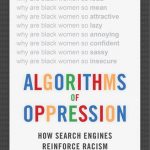Understanding the societal trajectory induced by AI, and anticipating its directions so that we might apply it for achieving equity, is a sociological, ethical, legal, cultural, generational, educational, and political problem.



Understanding the societal trajectory induced by AI, and anticipating its directions so that we might apply it for achieving equity, is a sociological, ethical, legal, cultural, generational, educational, and political problem.

Video doorbells and related technologies, along with the data they generate, will continue to be abused, undermining the security of what is being pitched as a security technology.

Examining how face recognition software is used to identify and sort citizenship within mechanisms like the Biometric Air Exit (BAE) is immensely important; alongside this, the process of how “citizen” and “noncitizen” is defined, as data points within larger mechanisms like the BAE, need to be made transparent.

Technological determinism is a myth; there are always underlying economic motivations for emergence of new technologies. The idea that technology leads development is not necessarily true, for example, con-sider AI. It has been a topic of inter-est to researchers for decades, but only recently has the funding caught up, matching the motivation and enabling the development of AI-ori-ented technologies to really take off.

Ethical diversity refers to “diverse beliefs … as to what are the most ethically appropriate or inappropriate courses of actions,” and takes into account the different values and beliefs people hold [2]. This diversity is and has always been a source of confusion and conflict, from the personal to the international. The answer, however, is to have forums to debate and discuss the ethical choices embedded in everyday life, not algorithms that render the choice being made invisible.

Will We Make Our Numbers? The year 2020 has a majority of the planet asking the simple question: “How do we stay alive? Competition is not working for the long-term sustainability of human and environmental well-being.

As we work to decouple carbon emissions and economic growth on the path to net zero emissions — so-called “clean growth” — we must also meaningfully deliver sustainable, inclusive growth with emerging technologies.

While many of us hear about the latest and greatest breakthrough in AI technology, what we hear less about is its environmental impact. In fact, much of AI’s recent progress has required ever-increasing amounts of data and computing power. We believe that tracking and communicating the environmental impact of ML should be a key part of the research and development process.

Disruptions can have positive as well as negative impacts on natural and human systems. Among the most fundamental disruptions to global society over the last century is the rise of big data, artificial intelligence (AI), and other digital technologies. These digital technologies have created new opportunities to understand and manage global systemic risks.

Two major forces are shaping the future of human civilization: anthropogenic climate change and the digital revolution. The changing climate is driving systemic shifts that threaten to destabilize the health and wellbeing of humankind and the natural systems on which they depend.

It is important to discuss both the potential and risks of machine learning (ML) and to inspire practitioners to use ML for beneficial objectives.

IEEE ISTAS 2019 Plenary 4 on 16 November ’19 focused on sharing insights into Brave New Brain-Tech: IEEE Neuroethics Program… Read More

As technology pervades all aspects of our existence, and Artificial Intelligence and machine learning systems become commonplace, a new era of human-computer interaction is emerging that will involve directing our focus beyond traditional approaches, to span other intricate interactions with computer-based systems.

Katina Michael, Director of the Center for Engineering, Policy and Society at Arizona State University speaks at TEDxASU 2019 about… Read More

Discrimination is “embedded in computer code and, increasingly, in artificial intelligence technologies that we are reliant on, by choice or not.”

Will AI be our biggest ever advance — or the biggest threat? The real danger of AI lies not in sudden apocalypse, but in the gradual degradation and disappearance of what make human experience and existence meaningful.